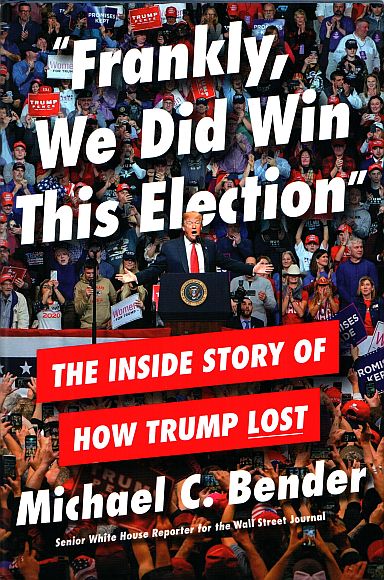

| “FRANKLY, WE DID WIN THIS ELECTION” The Inside Story of How Trump Lost Michael C. Bender New York: Twelve, July 2021 |
Rating: 5.0 High |
|||
| ISBN-13 978-1-5387-3480-3 | ||||
| ISBN-10 1-5387-3480-X | 417pp. | HC | $30.00 | |
This book begins by acquainting us with the Front Row Joes: a group of people so dedicated to Trump that they drive hundreds of miles and sleep in their cars in order to grab those coveted spots near the stage at his rallies. They are represented by Saundra Kiczenski, who bookends the author's tale. A middle-aged Wal-Mart worker, she flew to Trump rallies whenever she couldn't drive to them in her Honda Accord, and racked up a total of fifty-six rallies by the time Trump left the Oval Office. Throughout that period, her belief never wavered.
"If someone put a gun to my head and said, 'Did Donald Trump win, yes or no? And if you're wrong, we're going to shoot your head off!' I would say yes," Saundra said. "I'm that confident that this stuff is not made up." – Page 370 |
The bulk of the book is a very detailed chronicle of the campaign as it began in 2015 and continued through Trump's term. Events such as his two impeachments and the pandemic figure into it, as they must, but they are not given a great deal of coverage. This makes sense because they are amply covered elsewhere — notably in the books by Bob Woodward, Woodward & Costa, and Rucker & Leonnig.
It provides ample coverage of Trump's deplorable judgment. This assessment comes early in the book; the author probably reached it early.
That was the way Trump wanted it. While some executives preferred administrative silos to proivde direction and promote focus for the workforce, Trump assembled an extraordinary arrangement of delivery systems that incentivized his team to forage far and wide for bits and pieces of positivity—from news reports, gossip pages, social media posts—that they then fed directly to him. With certain exceptions, it ensured that the most obsequious and submissive staffers lasted the longest. By early 2020, it was widely understood that unquestioned agreement and alignment with Trump meant there were never any consequences for a staffer's mistakes, misfires, or bad advice. But to be proven wrong after even a single disagreement with Trump was to risk being forever viewed as disloyal and labeled an idot, or—in Trump's sarcastic vernacular—"a genius." The result was a constant reading of Good News from the Gospel according to Trump, and he had plenty of disciples eager to recite chapter and verse. – Page 91 |
In 2020, Blacks were 2.6 times more likely than whites to be shot and killed by police and 2.5 times more likely to be impoverished. When it came to Covid (sic), Blacks were 1.1 times more likely to be infected, 2.9 times more likely to be hospitalized, and 1.9 times more likely to die from it. For 46.8 million Black Americans, a life-threatening crisis seemed to lurk around every corner. Their deep frustrations over generations of racial tension now had a fresh layer of anxiety stemming from coronavirus. The country had turned into a tinderbox. And inside the Oval Office was a president who liked playing with matches. – Pages 134-135 |
The next few pages describe how little such matters, or violence toward Blacks at rallies and in the streets, mattered to the Trump campaign.
And this incident, also very typical of Trump, occurred late in the campaign: on 12 October 2021.
Trump had his health, yes. But the campaign was falling apart as the president continued to make the race about himself instead of Biden. At each rally, he'd air out all the problems plaguing his campaign, drawing attention to the white suburban women fleeing his side and the scores of seniors scared off by his refusal to take the pandemic seriously. Instead of working to win those voters back, Trump played the role of political prognosticator, verbalizing his worst nightmare about the abject embarrassment that would overwhelm him if he lost to Biden." – Page 298 |
Bender covers all the changes of personnel, the internecine disputes within the campaign, the battles with Ronna McDaniel and the Republican National Committee, and of course Trump's ill-considered actions. It is a useful examination of how modern campaigns work and how Trump mismanaged his. But in the end I found it hard to get through. I think this was mostly because I'd steeped myself in Trump coverage since before he won the Electoral College in 2016.
The book is well written and impressively researched, with a thorough set of endnotes. I'll give it full marks. However, it has no index and so I don't rate it a keeper.

 To contact Chris Winter, send email to this address.
To contact Chris Winter, send email to this address.